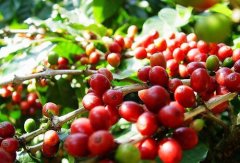A unique introduction to the sweet Indonesian Kopi Luwak
In Indonesian, "Kopi" means coffee, and "Luwak" is the name commonly known by Indonesians as "civet". Kopi Luwak, also known as Luwak Coffee, is called "the rarest coffee in existence". Specifically, this kind of coffee comes from the Indonesian island of Sumatra, where coffee trees grow for a long time. There is a local civet named Luwak, who likes to eat multi-paddled coffee fruits, but the hard coffee seeds are indigestible and excreted with feces. Indonesians have found that after the fermentation of civets' intestines and stomach, the extracted coffee beans have a unique sweet taste, even after three times of cooking, the taste is still mellow, and the rich and round sweet taste is incomparable to other coffee beans. the texture is crystal clear, free of impurities, and tastes as sweet as honey, making it the best in the world. So collect civet feces, sift out coffee beans, after thorough cleaning, deodorization, processing and other processes, bubble boil to drink. Due to the strict collection and processing standards, Luwak coffee is the most expensive coffee in the world because of its low production and high price.
Is the taste of Ruwak coffee Kopi Luwak really directly related to civets? The answer given by scientists is yes. First of all, Luwak is a natural expert at choosing coffee fruits. They are used to foraging at night, every night out in the coffee garden "treasure", with a keen sense of smell, will only look for jujube mature coffee fruit to eat, other not great will not eat, so the coffee beans excreted by it are all elite. Second, Luwak's digestive juices break down the protein in coffee beans into very small particles, which enhances the aroma of coffee during grinding. In addition, Luwak's intestines can filter out certain proteins, thereby reducing the bitterness of coffee. The researchers say that the process of Kopi Luwak coffee beans passing through the intestines and stomach of civets is very similar to the wet processing of coffee during fermentation, in which lactic acid bacteria play a key role.
In the international market, Luwak coffee has always been a veritable luxury. One of the main reasons is that it is not people but wild animals that make this kind of coffee. Traditionally, the coffee fruit is washed or sun-treated, removing the skin, pulp and sheep skin, and finally taking out the coffee beans, but Luwak coffee is made by natural fermentation in wild animals. What's more, these wild animals are found only on small islands such as Indonesia, and their time and place are mysterious, and their numbers are dwindling. Although Indonesia has claimed that the number of "civets" has rebounded steadily through protection and artificial feeding, the temptation of human taste buds, which depends on its digestive system, cannot be compared with the products of the industrial era.

Important Notice :
前街咖啡 FrontStreet Coffee has moved to new addredd:
FrontStreet Coffee Address: 315,Donghua East Road,GuangZhou
Tel:020 38364473
- Prev

Introduction to Antigua Coffee in Central America and Guatemala
Antigua coffee is smooth in taste and slightly charcoal-burning in aromatic alcohol, just like the sweetness of chocolate mixed with smoke. This kind of charcoal burning TOEFL in the nearby area, the volcano erupts every 30 years, allowing coffee trees to fully absorb the nitrogen emitted by the volcano during the eruption. Because of this unique charcoal incense, Antigua coffee is also known as cigarette coffee. In fact, its
- Next

Haiti coffee particles full flavor coffee encyclopedia
Fine coffee is fresh coffee. Whether it's food or drink, the fresher the better, and so is specialty coffee. Coffee beans should be kept fresh before making fine coffee, including the preservation of roasted beans, and the coffee beans should be ground before making, which is also to retain its most original and best flavor. And hand brewed coffee making is such a way to make fine coffee
Related
- Does Rose Summer choose Blue, Green or Red? Detailed explanation of Rose Summer Coffee plots and Classification in Panamanian Jade Manor
- What is the difference between the origin, producing area, processing plant, cooperative and manor of coffee beans?
- How fine does the espresso powder fit? how to grind the espresso?
- Sca coffee roasting degree color card coffee roasting degree 8 roasting color values what do you mean?
- The practice of lattes: how to make lattes at home
- Introduction to Indonesian Fine Coffee beans-- Java Coffee producing area of Indonesian Arabica Coffee
- How much will the flavor of light and medium roasted rose summer be expressed? What baking level is rose summer suitable for?
- Introduction to the characteristics of washing, sun-drying or wet-planing coffee commonly used in Mantenin, Indonesia
- Price characteristics of Arabica Coffee Bean Starbucks introduction to Manning Coffee Bean Taste producing area Variety Manor
- What is the authentic Yega flavor? What are the flavor characteristics of the really excellent Yejasuffi coffee beans?

